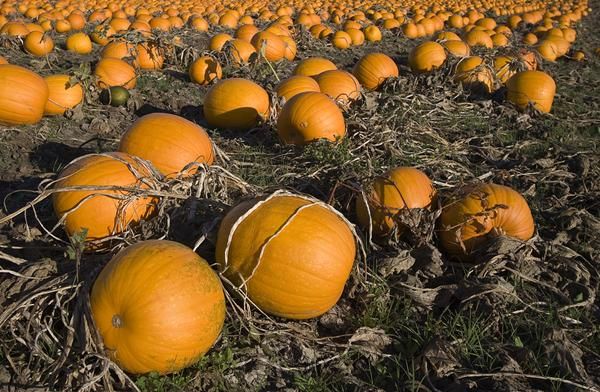
Scary Thought: A Halloween Without Pumpkins

Trick-or-treaters may see fewer pumpkins on their rounds this year, thanks to a series of natural calamities that befell East Coast pumpkin farmers this year, with the coup de grâce coming from Hurricane Irene.
The series of unfortunate events began when spring rains pushed back the planting of pumpkin seeds. Then there was a spates of rain over the summer, causing outbreaks of phytophthora fungus, a type of water mold that wreaks havoc on the gourds. And to complete the hat trick, Irene dumped enough rain to wash out entire pumpkin patches.
If the rain didn't wash away the crop, it made the ground soggy enough that the gourds began to rot while still in the process of growing. One of the problems, say the experts, is that pumpkins need three to four months of dry, warm weather to grow and that just has not happened in 2011 in many parts of the country.
Pumpkin refrain
Reports are that this fall's pumpkin crop in the East is a small one, but, according to some experts, the risk of a pumpkin-less fall holiday is a common refrain. [Related: Leaf Peeper Paradise: Autumn's Best Colors ]
"I hear it every year that there aren't enough pumpkins," said Gretchen Voyle, a horticulture educator at Michigan State University Extension School. She added that she thinks there's a bit of pumpkin speculation out there.
Voyle said that in many places, the supply has actually increased with more people growing food at home this year than in the past. Even though there may be shortages in certain places, such as the Northeast, there are plenty of pumpkins to go around the country.
Sign up for the Live Science daily newsletter now
Get the world’s most fascinating discoveries delivered straight to your inbox.
"I drive by fields and there are pumpkins as far as the eye can see," she told OurAmazingPlanet. "I know there are a lot of pumpkins out there, but we need to get them to the East Coast."
One of the problems of getting a jack-o'-lantern to everyone who wants one is transportation. The price that farmers get for pumpkins isn't high enough to make special transport available to take the pumpkins from areas of plenty to where there's a shortage.
Voyle says there is one way that pumpkins could make the trip: "What would work is if you had a semi truck and you were hauling something to Michigan and didn't have a load to go back. Then the drivers just need to make contact with some growers it would be great. Voyle says that the day after Halloween, she drives by fields of pumpkins left to rot and be plowed back into the soil for fertilizer.
Pumpkins and you
When choosing a pumpkin, Voyle recommends checking it out thoroughly before making a commitment. "Roll it over and look at all sides, press on it with the pads of your fingers," she said. Larger pumpkins can start to rot from the bottom, especially if they have been sitting in wet soil, so check carefully.
When you get your pumpkin home, Voyle advises waiting until the last possible minute to carve it up especially in warm climates or places that may still have a warm snap. "Once you start cutting, the taxi meter is ticking," she said.
And if you start to feel like growing your own, plant some seeds in the spring that way, no shortage will shed a spooky shadow on your Halloween plans.












